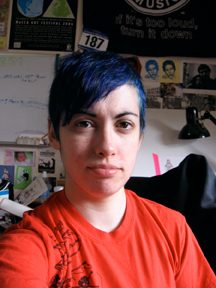The queer indie illustrator and cartoonist talks gender, sexuality and representation of LGBT youth.
Liz Baillie is a native New Yorker and queer-identified indie cartoonist and illustrator. Her work has appeared in numerous zines and anthologies, including Other magazine and Mauled! In My Brain Hurts, a brilliantly designed collection of stories, she acutely portrays New York City teens in search of identity, meaning and acceptance. She mines rich complexities with empathetic wit and a sense of wonder.
You recently finished volume one of My Brain Hurts. How does it feel?
It’s a mixture of elation and sadness. Kind of like a breakup you knew was inevitable and you still love the person, but you just can’t live with them anymore. I’m happy to end it, in a way, because it was my first long project, and now I know I’m capable of starting and finishing such a thing, which is a great feeling. I’m a little sad though because I’ve been with these characters about eight years now, and, cheesy as it sounds, they’ve become a part of me.
How much of your work is autobiographical? Are there any characters or stories with which you most identify?
People frequently ask me if MBH is autobiographical and usually I will emphatically state that it is not, because it is not literally autobiography. I’d say a good 90 to 95 percent of the stuff in MBH never happened to me. However, the character of Kate is based upon myself at her age—16—in terms of the way she acts, the way she looks, the way she interacts with people. I was never quite as bold as her though!
You focus a lot on queer youth. Why?
I was a queer youth, so I remembered how it felt going through adolescence, never being sure of who I was, never feeling like there was a label that quite fit me…and how I was always searching for someone like me in movies, TV, books. I created MBH, in part, to provide something that [the] 16-year-old me would have related to. There are examples of queerness in media and there are punk kids in media, but there were no stories about queer punk kids—or at least not that many—so I made one.
Your work clearly shows an interest in gender and sexuality theory and LGBT history. What LGBT historical figures would you like to portray?
I might like to do something about Leslie Feinberg again. Anyone who bucks traditional ideas of gender is of interest to me, really….Gender and sexuality [are] two things I never get tired of exploring.
